Hezbollah deputy chief vows to continue fighting after IDF strikes killed Hamas leader in Lebanon
In short:
Hezbollah's deputy chief Naim Qassem said the group would choose a new leader "at the earliest opportunity" after the killing of Hassan Nasrallah on Friday by the Israeli air force.
Palestinian militant group Hamas said an Israeli strike in south Lebanon killed its leader on Monday, while another group said three of its leaders were killed in a strike on Beirut — the first attack within the city limits.
What's next?
Israel is pressing on with strikes in Lebanon after the killing of Hezbollah leader Hassan Nasrallah, despite global calls for restraint and hundreds of thousands of Lebanese people being displaced.
Hezbollah's deputy leader says the movement is ready to confront any Israeli ground invasion of Lebanon, in a first address since Israel assassinated former leader Hassan Nasrallah last week.
Israel will not achieve its goals, Naim Qassem said in a televised address on Monday.
"We will face any possibility and we are ready if the Israelis decide to enter by land and the resistance forces are ready for a ground engagement."
He said the Lebanese militant group would choose a successor to its slain secretary-general "at the earliest opportunity".
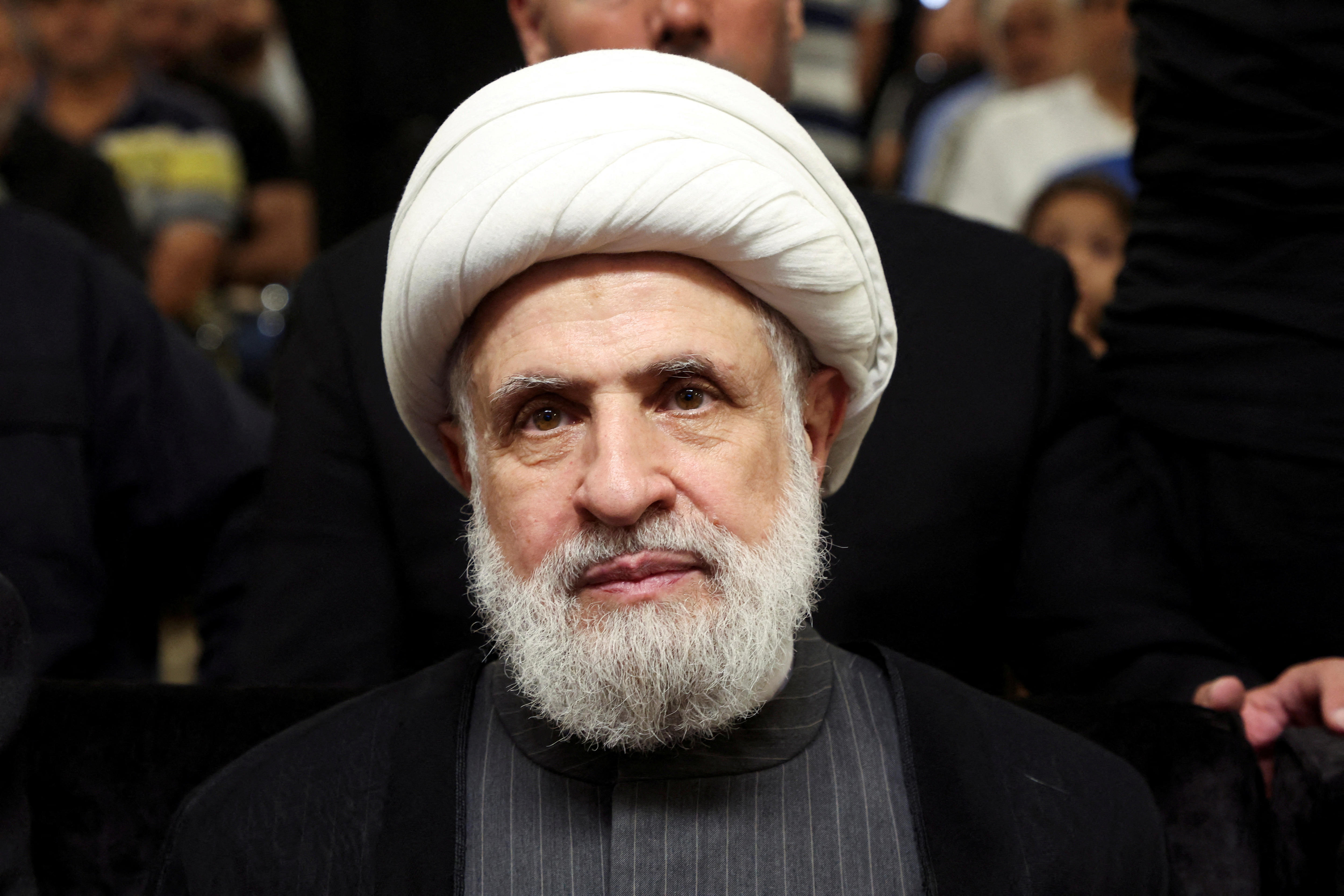
Hezbollah deputy leader Sheikh Naim Qassem said the group will continue to fight despite the loss of their leader Hassan Nasrallah.
Israeli forces have dealt multiple blows to Hezbollah in a two-week wave of attacks on targets in Lebanon that has eliminated several commanders.
Qassem said the group was continuing its operations, working according to plans already laid out, and described its attacks thus far as the "minimum", adding that the battle could be long.
These are the latest developments:
- Palestinian militia leaders killed
- Four killed in IDF strikes on Yemen
- Seventh senior Hezbollah leader killed
- Joe Biden says 'really have to avoid' all-out war
- One million Lebanese civilians displaced
- Iran calls for 'decisive response'
Palestinian militia leaders killed and southern towns targeted
An apartment building in central Beirut was hit by an apparent Israeli air strike early on Monday morning, in the first attack within city limits during the last year of conflict between Israel and Iran's regional allies.
Witnesses told Reuters and Associated Press reporters on the ground that the strike hit the top floor of a multi-storey residential building in the Kola district of Lebanon's capital.
Videos showed ambulances and a crowd gathered near the building, located in a mainly Sunni district with a busy thoroughfare lined with shops.
The Popular Front for the Liberation of Palestine (PFLP) said three of its leaders were killed in a strike that targeted Beirut's Kola district.
There was no immediate comment from Israel's military.
In the past week, Israel has frequently targeted Beirut's southern suburbs, where Hezbollah has a strong presence, but it had not hit locations near the city centre.
Hamas said on Monday that its leader in Lebanon had been killed in an air strike in the country's south, as official media reported a strike on a Palestinian refugee camp in the area.
"Fatah Sharif Abu al-Amine, the leader of Hamas … in Lebanon and member of the movement's leadership abroad" was killed in a strike on his "home in the Al-Bass camp in south Lebanon", a Hamas statement said.
It said he was killed with his wife, son and daughter in a "terrorist and criminal assassination".
The official National News Agency reported an air strike on the camp near the southern city of Tyre, saying it was the "first time" the camp had been targeted.
Elsewhere, a strike on the southern Lebanese town of Ain Deleb killed 45 people, Lebanon's health ministry said on Monday.
Four killed in IDF strikes on Yemen
Israel says it has bombed Houthi targets in Yemen, expanding its confrontation with Iran's allies in the region two days after killing the leader of Lebanese armed group Hezbollah, Hassan Nasrallah, in an escalating conflict in Lebanon.
The air strikes on Yemen's sea port facilities and power plants on Sunday, local time, were in response to Houthi missile attacks on Israel in recent days, Israel's military said.
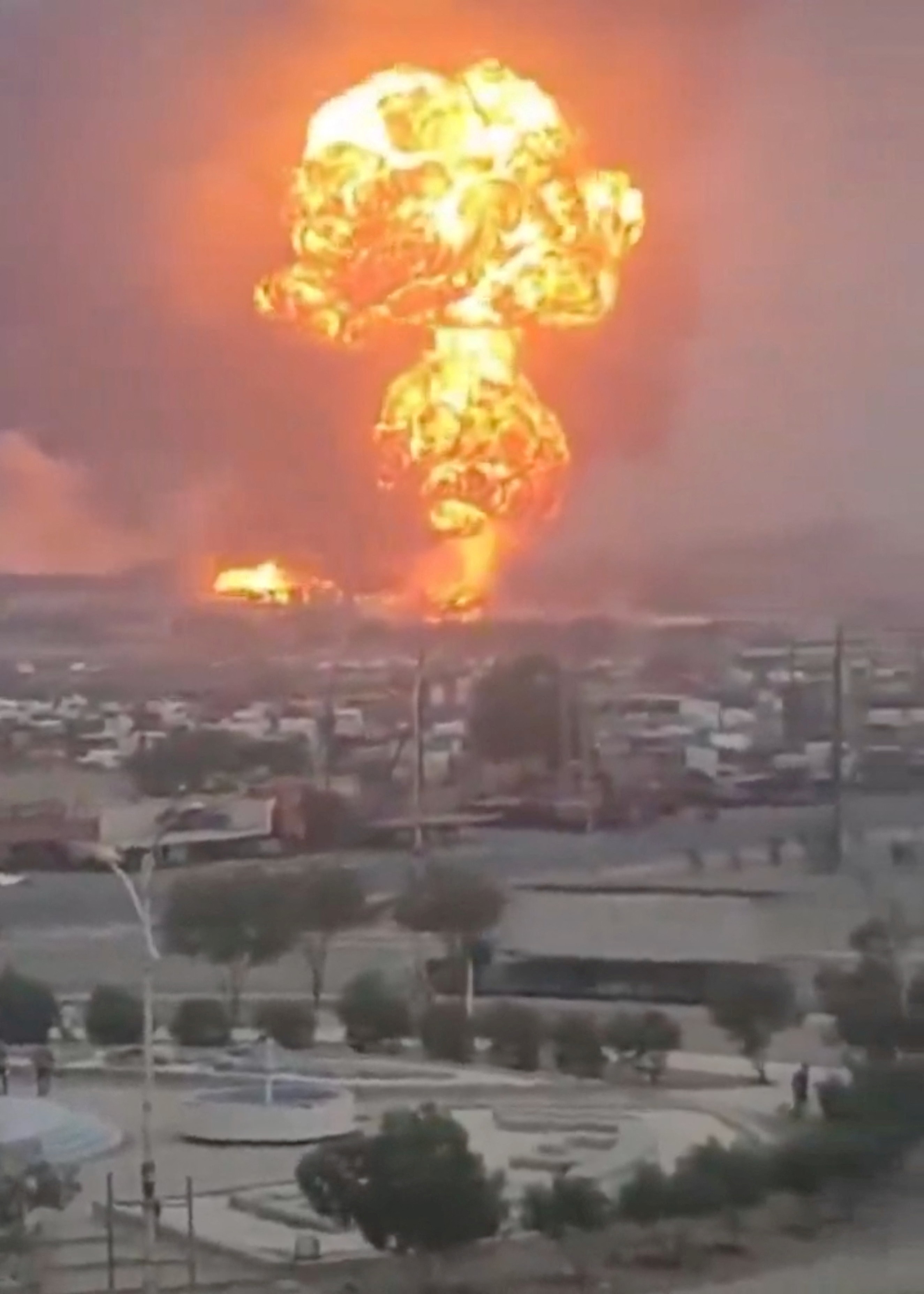
This view shows an explosion following Israeli strikes in Hodeidah, Yemen, in a screen grab obtained from a social media video released on September 29, 2024.
Houthi media said the Hodeida and Ras Issa ports were hit, along with two power plants in Hodeida city, a stronghold for the Iranian-backed rebels.
The Houthi-run health ministry said the strikes killed four people and wounded 40 others.
Nasruddin Ammer, deputy director of its media office, said in a post on X the strikes would not stop the rebels' attacks on shipping routes and on Israel.
On Saturday, the Yemeni armed rebels launched a ballistic missile attack on Ben Gurion airport when Israeli Prime Minister Benjamin Netanyahu was arriving.
The strikes took place as Israel attacked more targets in Lebanon, where its intensifying bombardment over two weeks has killed a string of top Hezbollah leaders and driven hundreds of thousands of people from their homes.
Israel on Sunday vowed to keep up its assault.
"It has lost its head, and we need to keep hitting Hezbollah hard," Israel's military chief of staff, Herzi Halevi, said.
Seventh senior Hezbollah leader killed
Hezbollah has sustained a string of deadly blows to its command structure, including the killing of its overall leader, Nasrallah.
Deputy head of the militant group's Central Council, Nabil Kaouk, was also killed on Saturday, making him the seventh senior Hezbollah leader slain in Israeli strikes in a little over a week. They include founding members who had evaded death or detention for decades.
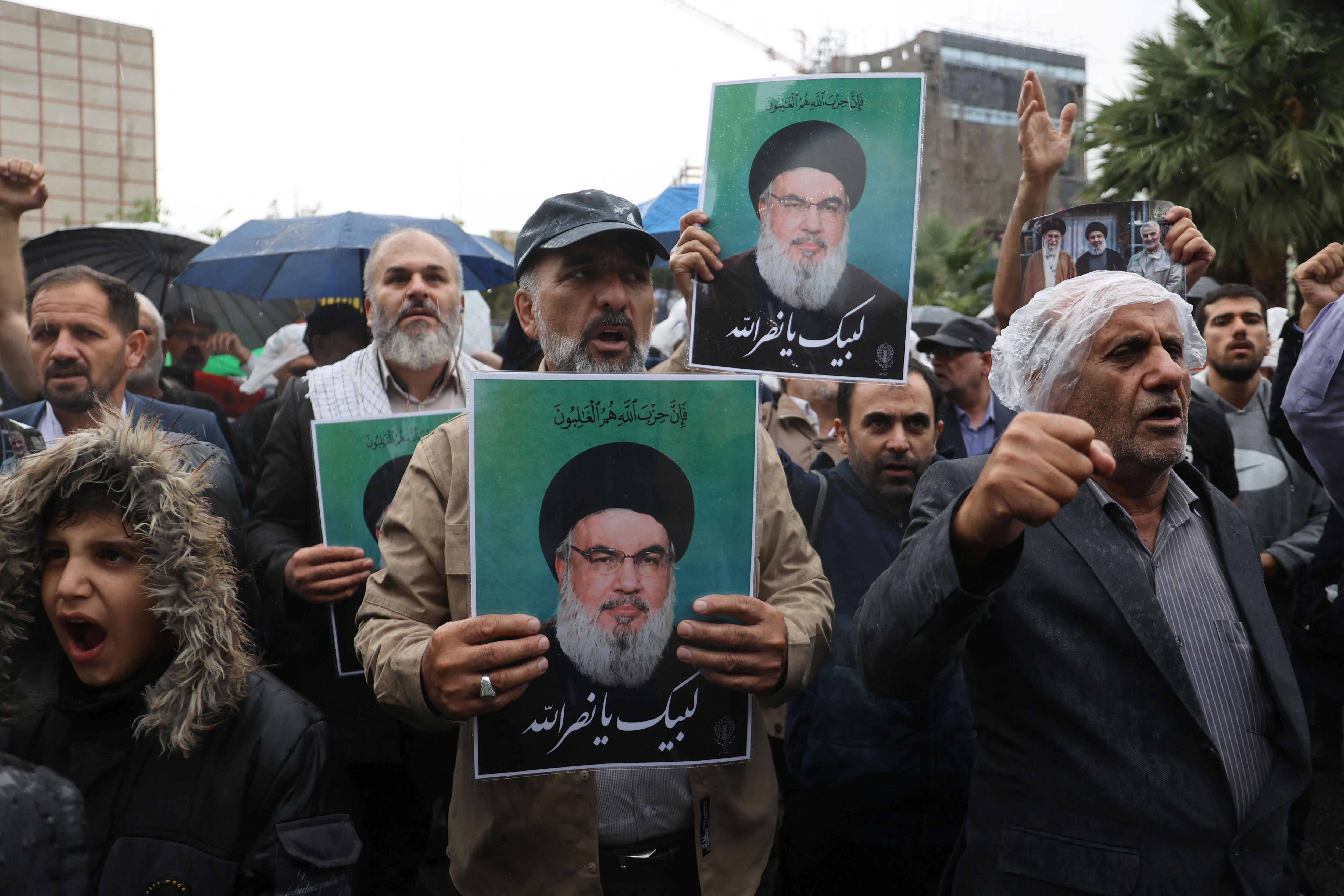
People gather to mourn the death of Lebanon's Hezbollah leader Sayyed Hassan Nasrallah, in Tehran.
Kaouk was a veteran member of Hezbollah going back to the 1980s and served as Hezbollah's military commander in southern Lebanon during the 2006 war with Israel. The US announced sanctions against him in 2020.
Hezbollah had earlier confirmed that Ali Karaki, another senior commander, died in Friday's strike that killed Nasrallah.
Israel says at least 20 other Hezbollah militants were killed, including one in charge of Nasrallah's security detail.
White House national security spokesman John Kirby said Israel's air strikes in Lebanon had "wiped out" Hezbollah's command structure, but he warned the group would work quickly to rebuild it.
"I think people are safer without him walking around," he said of Nasrallah. "But they will try to recover. We're watching to see what they do to try to fill this leadership vacuum."
Speaking on CNN's State of the Union, Mr Kirby sidestepped questions about whether the Biden administration agreed with how the Israelis were targeting Hezbollah leaders.
Biden says 'really have to avoid' all-out war
The White House continues to call on Israel and Hezbollah to agree to a 21-day temporary ceasefire floated by the US, France and other countries as world leaders gathered for the UN General Assembly last week.
President Joe Biden said on Sunday he would speak with Mr Netanyahu, and believes that an all-out war in the Middle East must be avoided.
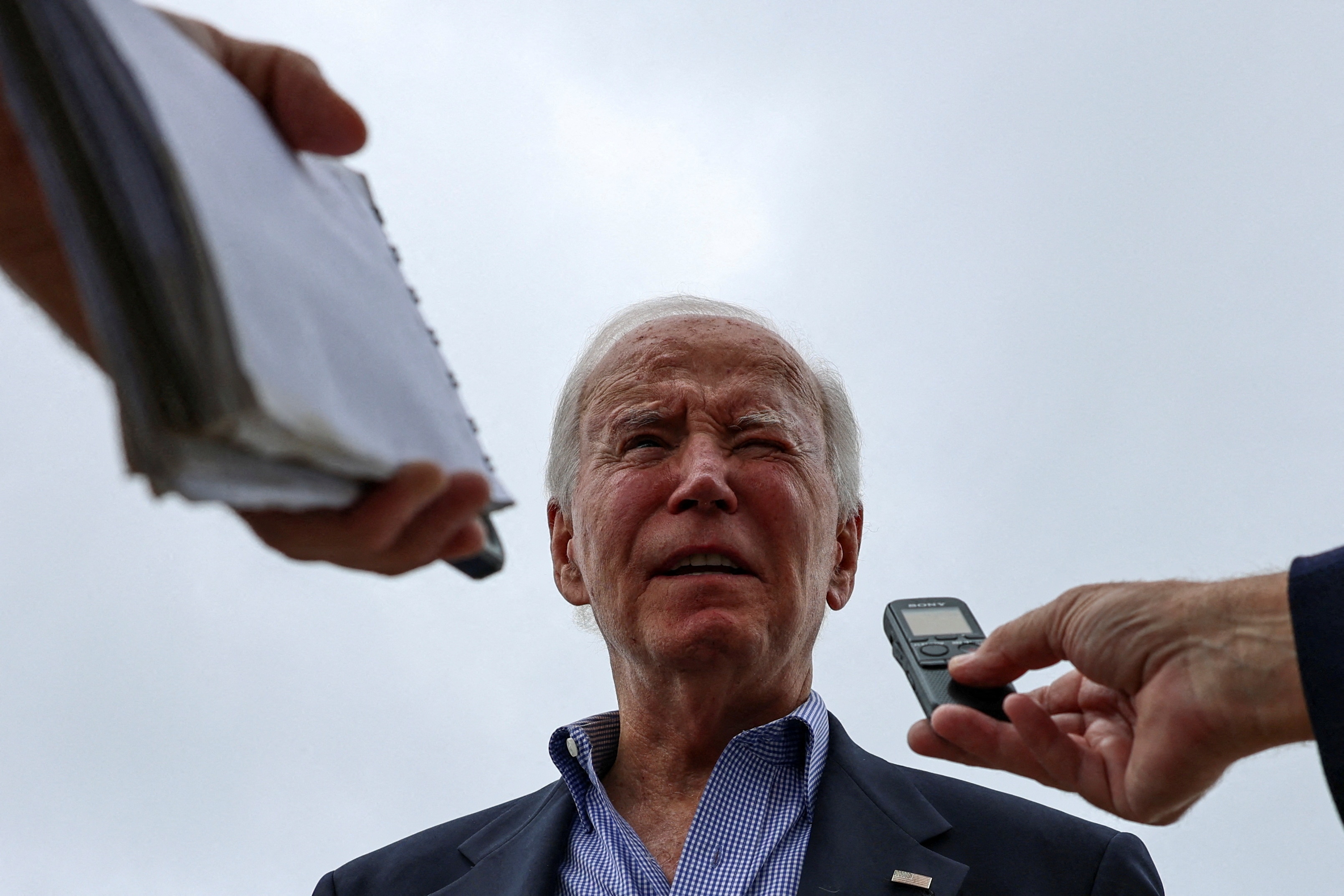
Joe Biden speaks to the media before boarding Air Force One, en route to Washington on Sunday.
"It has to be," he told reporters at Dover Air Force Base in Delaware. "We really have to avoid it."
Mr Biden also said he would be speaking with the Israeli leader but did not say when: "I'll tell you what I say when I talk to him."
The United States has urged a diplomatic resolution to the conflict in Lebanon but has also authorised its military to reinforce in the region.
It has been unable to use any leverage over Israel through its recent stretch of fighting with Hezbollah. White House officials have said they received no prior intelligence ahead of the the IDF's strikes on Beirut, including the one that killed Nasrallah, this week.
But Washington was accused of complicity in the attack by Tehran, who claimed a US-supplied "bunker buster" bomb was used in the attack. US senator Mark Kelly later confirmed the bomb used to kill Nasrallah was an American-made 900-kilogram guided weapon.
Meanwhile, Mr Netanyahu on Sunday appointed a former rival, Gideon Saar, to his cabinet in a move that expands his governing coalition and helps entrench himself in office.
Under their agreement, he said Mr Saar would be given a spot in the security cabinet, the body that oversees management of the ongoing war.
Mr Saar had hoped to replace Defense Minister Yoav Gallant, another rival of Mr Netanyahu's. But that deal fell through after fighting intensified with Hezbollah.
An EU spokesperson also announced on Monday that its foreign policy chief was convening an informal meeting of foreign ministers to discuss the EU's response to the escalation of fighting in Lebanon.
The president of the United Arab Emirates, Sheikh Mohamed bin Zayed Al Nahyan, pledged on Monday an urgent relief aid package worth $US100 million ($144 million) to Lebanon, the state news agency WAM reported.
Nearly one-fifth of Lebanon's population displaced
Elsewhere, Israeli warplanes and drones carried out deadly strikes across Lebanon on Sunday.
Two consecutive strikes near the southern city of Sidon, about 45km south of Beirut, killed at least 32 people, including at least 14 medics, the Lebanese health ministry said. Separately, Israeli strikes in the northern province of Baalbek Hermel killed 21 people and injured at least 47.
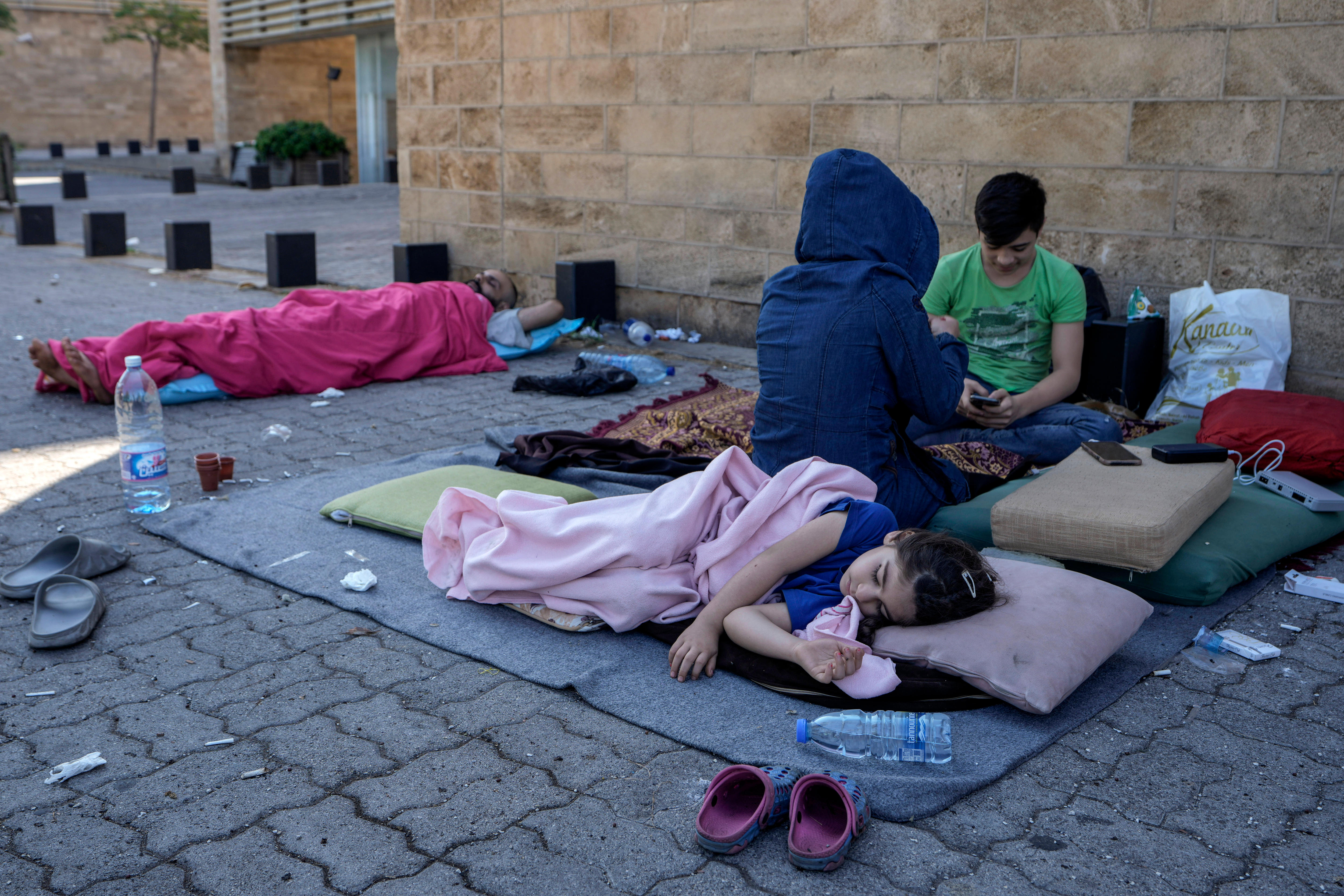
A family sleep on the ground in Beirut's corniche area after fleeing Israeli airstrikes in the southern suburbs of Dahiyeh.
The IDF said it also carried out another targeted strike on Beirut, but did not immediately provide details.
Lebanese media reported dozens of strikes in the central, eastern and western Bekaa and in the south, besides strikes on Beirut. The strikes have targeted buildings where civilians were living and the death toll was expected to rise.
The death toll in IDF strikes across Lebanon on Sunday stands at 105.
Lebanon's Health Ministry has said more than 1,000 Lebanese have been killed and 6,000 wounded in the past two weeks.
The IDF says its strikes have degraded Hezbollah's capabilities and the number of launches would be much higher if Hezbollah had not been hit.
In response to the dramatic escalation, Hezbollah has also significantly increased its retaliatory attacks in the past week, from several dozen to several hundred daily, the Israeli military said.
These have mainly targeted northern Israel but most rockets and drones were intercepted by Israel's air defence systems or fell in open areas. Several injuries were reported.
Earlier this month, Hezbollah was also targeted by a sophisticated attack on its pagers and walkie-talkies that was widely blamed on Israel.
A wave of Israeli strikes across large parts of Lebanon has killed more than 1,030 people — including 156 women and 87 children — in less than two weeks, according to Lebanon's Health Ministry.
Hundreds of thousands of people have been driven from their homes across the country by the latest strikes.
The government estimates around 250,000 are in shelters, with three to four times as many staying with friends or relatives, or camping out on the streets.
Some 100,000 people have now fled to Syria from Lebanon amid Israeli air strikes, the United Nations refugee chief said on Monday.
"The number of people who have crossed into Syria from Lebanon fleeing Israeli air strikes — Lebanese and Syrian nationals — has reached 100,000," Filippo Grandi said on X, adding that "the outflow continues".
He said his UN refugee agency (UNHCR) was "present at four crossing points, alongside local authorities and [the Syrian Red Crescent] to support new arrivals".
Iran calls for 'decisive response'
Iranian President Masoud Pezeshkian characterised the Israeli attacks on Hezbollah as a crime and said a "decisive response" was needed following the killing of numerous Hezbollah leaders.
"The Lebanese fighters should not be left alone in this battle," he said during a Sunday cabinet meeting, his office reported. He also condemned the IDF's air strikes in Yemen.
Iran's foreign ministry spokesperson said on Monday they were speaking with Lebanese authorities about "the criminal acts of the Zionist regime" that is Israel.
"We stand strongly and we will act in a way that is regretful [for the enemy]," the spokesperson added.
Iranian Supreme Leader Ayatollah Ali Khamenei was moved to a secure location in Iran after Nasrallah's killing, sources told Reuters.
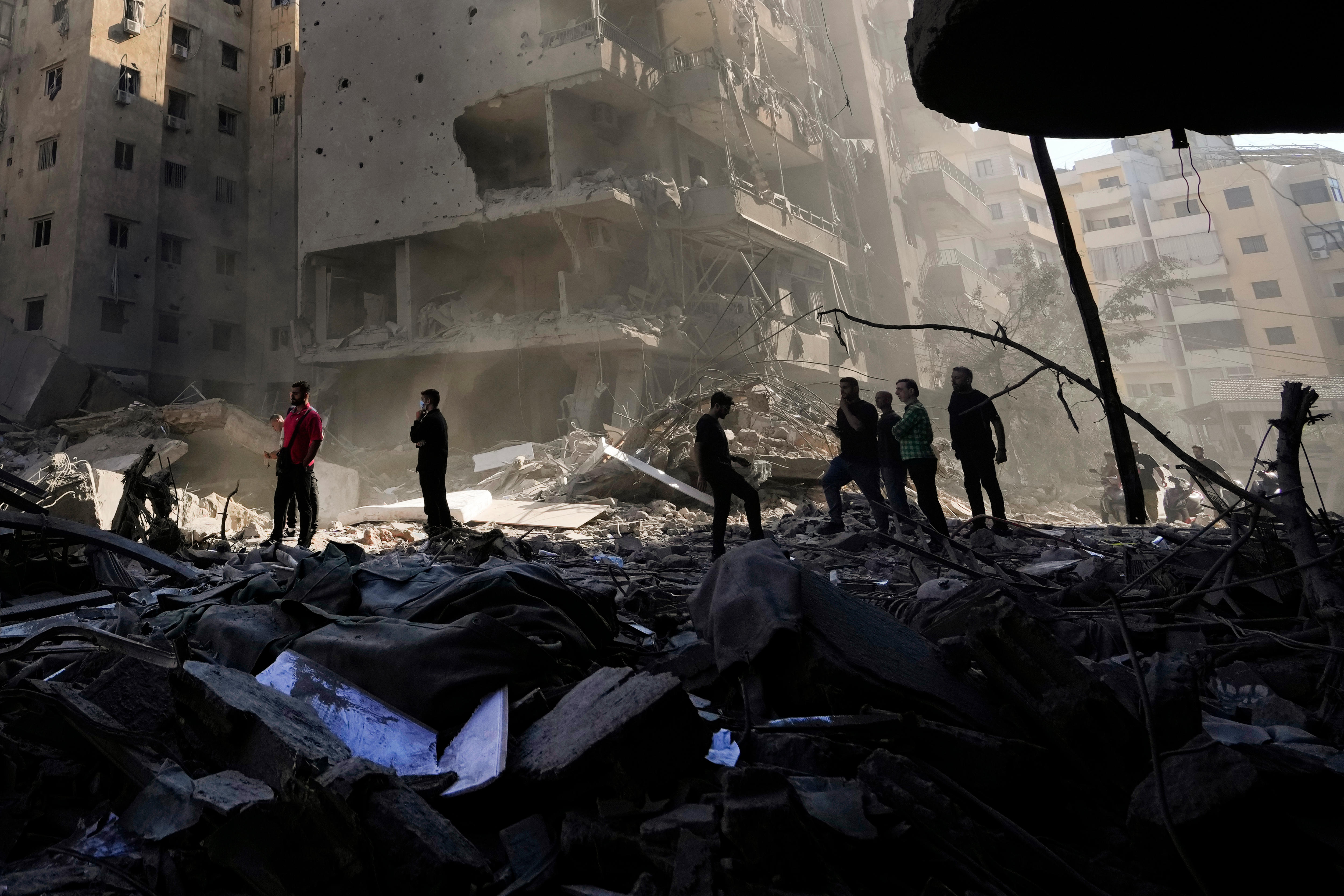
People check the site of the assassination of Hezbollah leader Hassan Nasrallah in Beirut's southern suburbs.
Iran has armed and trained Hezbollah for decades and relied on it to put pressure on Israel, its chief regional rival.
Hezbollah began firing rockets, missiles and drones into northern Israel after Hamas's October 7 terror attack out of Gaza.
Hezbollah and Hamas are allies that consider themselves part of an Iran-backed "Axis of Resistance" against Israel.
The conflict has steadily ratcheted up to the brink of all-out war, raising fears of a region-wide conflagration. Israel and Hezbollah fought a devastating month-long war in 2006 that ended in a draw.
Israel says it is determined to return some 60,000 of its citizens to communities in the north that were evacuated nearly a year ago.
Hezbollah has said it will only halt its rocket fire if there is a ceasefire in Gaza, which has proven elusive despite months of indirect negotiations between Israel and Hamas led by the United States, Qatar and Egypt.
ABC/wires
By:https://www.abc.net.au/news/2024-09-30/israel-bombs-houthi-targets-yemen-as-hezbollah-leader-dead/104411480(责任编辑:admin)
下一篇:Mt Everest's fast growth partly caused by rivers merging 89,000 years ago: study
 Socceroos rescue a point
Socceroos rescue a point  Wallabies thrash Wales 52
Wallabies thrash Wales 52 Jake Paul beats Mike Tyso
Jake Paul beats Mike Tyso Live updates: England vs
Live updates: England vs  US election 2024: Donald
US election 2024: Donald 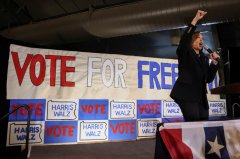 US election live: Kamala
US election live: Kamala
- ·North Korea's latest weapon agains
- ·Hezbollah says Israel 'cannot impo
- ·Inside the rise of US oligarchs and how
- ·Thailand's worst suspected serial
- ·Tabi shoes are turning heads from Holly
- ·FBI arrests Florida man planning attack
- ·Illegal immigrant gets life sentence fo
- ·Bibles, water, watches and sneakers: Do
- ·North Korea's latest weapon against
- ·Hezbollah says Israel 'cannot impose
- ·Inside the rise of US oligarchs and how i
- ·Thailand's worst suspected serial ki
- ·Tabi shoes are turning heads from Hollywo
- ·FBI arrests Florida man planning attack o
- ·Illegal immigrant gets life sentence for
- ·Bibles, water, watches and sneakers: Dona
- ·US to give Kyiv anti-personnel landmines
- ·An arrest warrant for Benjamin Netanyahu
- ·One of Vietnam's high-profile politi
- ·Shanghai Walmart Attack: A Man Randomly S
- ·South Korean police officers jailed over
- ·Cambodia publicly shames maid deported af
- ·North Korea to use all forces including n
- ·Philippines condemns China attack of Viet
- ·US adds 2 more Chinese companies to Uyghu
- ·North Korean defector steals South Korean
- ·Malaysia deports Cambodian worker for cal
- ·Rebels battle for Myanmar junta’s weste

